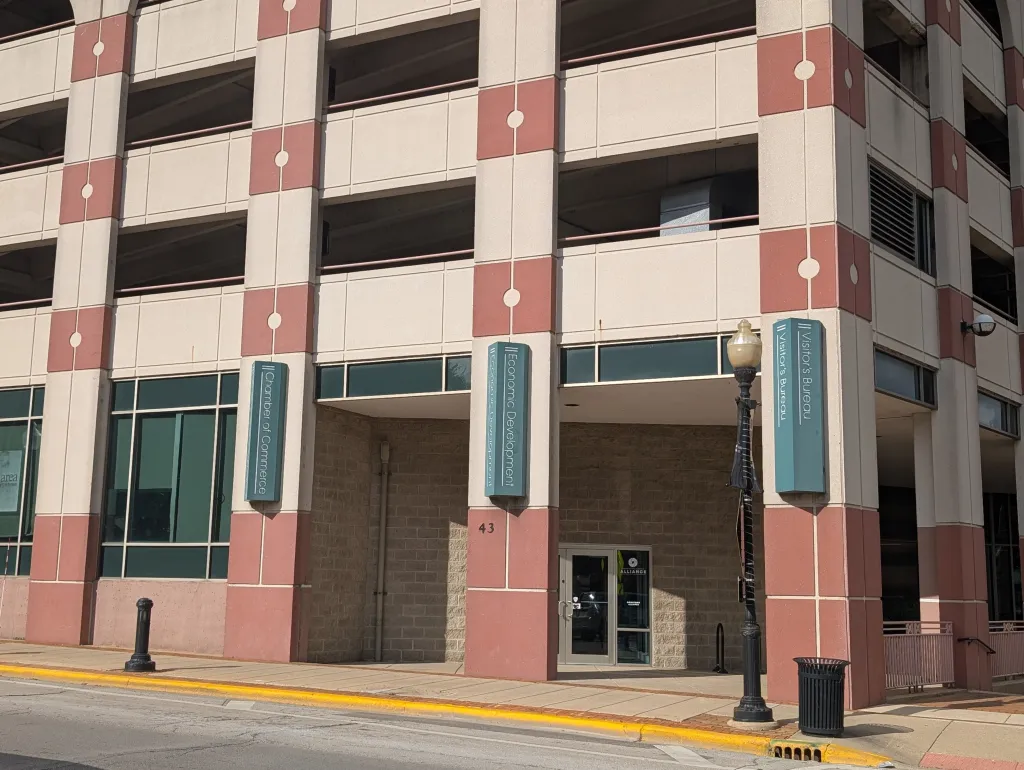
Trips around the country and beyond, tens of thousands of dollars spent at restaurants, cash withdraws from ATMs and visits to adult entertainment establishments.
Those are just some of the reasons Aurora Mayor John Laesch has given to describe how OnLight Aurora, a city-connected organization established to manage Aurora’s fiber network, was financially mismanaged and has around $1 million in debt that the city could be on the hook for.
Those formerly in charge of OnLight dispute Laesch’s claims about what the organization spent money on. Also, they say Laesch is overreaching in his power as mayor and is targeting those associated with former Mayor Richard Irvin’s administration.
The city-owned fiber network managed by OnLight, according to a recent presentation by Laesch, stretches for over 60 miles and provides internet access to city government facilities as well as other institutions and businesses located in Aurora.
Laesch has said he is working to stabilize the organization, but if it ends up dissolving, its assets would revert back to the city. Aurora may also have to take on the organization’s roughly $1 million debt if it dissolves, city staff have said.
The state of OnLight’s finances
OnLight Aurora is losing $27,000 each month, a large part of which is because of debt payments, Laesch said during a presentation to the Aurora City Council earlier this month.
“Stunned is an understatement,” Aurora Ald. Ted Mesiacos, 3rd Ward, said after the presentation. “What you are showing us is of serious concern for our financial security.”
Laesch alleged during the meeting that the organization got to its current financial state in part because of three failed attempts to bring internet service through city fiber to residents’ homes, including one that ended up costing over $110,000 in legal fees. And the organization, which had two employees, had a payroll of around $200,000 each year, he said.
There have also been roughly $337,000 in “unregulated debit card expenses for marketing purposes” since 2018, Laesch said during the presentation. Of that amount, $10,000 was spent in the six-week period between when he won the election in April and when he was inaugurated in May, according to the presentation.
He later showed a chart listing broad categories of expenses apparently categorized as being for marketing over the past seven years, including over $50,000 in cash withdraws, over $45,000 on sponsorships, over $24,000 for airfare, nearly $26,000 for lodging, over $10,000 for limos or car services, over $62,000 for restaurants and bars, over $7,000 at “adult entertainment clubs” and almost $700 in political contributions, among others.
The city of Aurora provided The Beacon-News with bank records and spreadsheets showing that data in greater detail. The records show that, on just the day before Laesch took office as mayor, thousands of dollars were taken out from an ATM and hundreds of dollars of Uber charges were posted to the account.
OnLight money was spent in a variety of cities around the country and beyond, including in Ireland and Spain, according to Laesch’s presentation earlier this month.
As an example, financial records shared with The Beacon-News by the city of Aurora show that OnLight funds were spent in Pompano Beach, Florida, multiple times since 2021, including in January of this year. Expenses from that location found in cross-referenced spreadsheets and bank statements include at least $1,900 withdrawn from ATMs, $1,700 spent on merchandise, $800 spent on food and $200 spent at the Diamond Dolls adult entertainment club.
“This is after they stopped sending expense reports, so we have no idea what was actually purchased there,” Austin FitzCorbett, who is now serving as OnLight’s director on a volunteer basis after its former director was cut for cost reasons, said of the merchandise purchases.
Though money was spent elsewhere, Aurora is where much of the debit card spending took place, including over $10,000 spent at La Quinta de los Reyes, over $6,000 spent at French 75 and over $2,000 spent at O’Malley’s Pub and Eatery, Laesch’s presentation showed.
While some of the debit card expenses were for seemingly legitimate marketing purposes or conferences, those expenses only totaled around $5,000 of the $337,000 spent since 2018, Laesch said in his presentation.
FitzCorbett told The Beacon-News that it doesn’t really matter if all the trips taken by OnLight leadership were legitimately for going to conferences, because “obviously it wasn’t worthwhile.” While the spending was happening, the organization lost 12 customers and gained only one, according to Laesch’s presentation.
OnLight Aurora is actually two different organizations: one is a nonprofit that provides internet to the city and other local institutions through the city-owned fiber network, and the other is a low-profit limited liability company, also called an L3C, that is almost completely owned by the nonprofit and was set up to sell internet access through the fiber network to other businesses.
According to Laesch, it is the nonprofit arm that is roughly $1 million in debt. However, the nonprofit was regularly transferring money to the L3C arm of the organization, which is where the debit card payments were being made from, he said.
Former OnLight leadership responds to Laesch’s accusations
Laesch said in a recent interview with The Beacon-News that the “marketing” transactions were made from the debit card of Michael Pegues, who served as the chair of the OnLight board and led the L3C arm of the organization. Pegues was also the city of Aurora’s chief information officer under former Mayor Richard Irvin and served on the board because of that city role.
When asked about the alleged expenses, Pegues told The Beacon-News that Laesch was making unfounded accusations and was overreaching in his role as mayor.
Pegues said Laesch is doing this just to get revenge against anyone associated with the previous administration led by former Mayor Richard Irvin, of whom Laesch was a vocal critic. Laesch dismissed Pegues’ allegations by saying he wishes “they had not wasted all this money on trips, travel, wining and dining, people, gentleman’s clubs,” but “it’s a decision they made.”
“I wish the city and OnLight were both in financially stable situations. That would have made it much easier to do the things that I campaigned on and wanted to do.” Laesch said. “I wish we were offered a stable ship with smooth sailing, but that’s not what we got.”
Pegues has previously come under scrutiny for his use of OnLight funds. In 2022, the Chicago Tribune reported that OnLight sponsored events put on by Pegues’ wife while he was in leadership roles at the organization, and that Aurora police asked the FBI to investigate Pegues over claims he fired contractors for not sponsoring his wife’s events.
Pegues told the Tribune at the time that he didn’t do anything improper. The FBI did not immediately respond to a recent request for comment.
Onlight’s former executive director, Charles Baker, said that he disagrees with how the expenses were categorized by Laesch’s presentation and that he was always frugal with the organization’s money during his five-year tenure.
According to Laesch, Baker was let go from the organization for cost-cutting reasons. Also, in the letter of termination the city sent Baker, which he shared with The Beacon-News, it says the decision was made “solely due to the organization’s ongoing and significant financial challenges” and that it was “not related in any way to your job performance” or any personal characteristics.
Baker said his firing was unlawful and unjust.
When Laesch first came into office, Baker was willing to work with him for the good of the community, Baker told The Beacon-News. And while he was originally asked to stay on, Baker said, he now believes the Laesch administration was on “an orchestrated campaign” to get him out of the job.
Laesch said Baker originally agreed to leave because of the organization’s financial state but later changed his mind.
Baker denied Laesch’s version of events, saying that he was in shock when he was told he was being let go and didn’t know how to respond. But later, Baker said, he realized that “these guys have been trying to undermine me and prevent me from doing my job” for months.
He said that his last paycheck is being withheld, and he has not received his contractually-obligated severance pay, so he has filed a claim with the state labor department. Baker provided The Beacon-News with a copy of the claim and a receipt showing it had been submitted.
Baker also believes the city recently targeted his wife by trying to fire her, but she was instead put on administrative leave after getting the union involved, he said. According to Laesch, several people in Baker’s wife’s department were removed “as a part of a scaling back that continues to happen,” but she was not specifically targeted.
Baker said that Laesch didn’t even have the authority to fire him or to have access to OnLight’s finances, as the mayor was not properly installed on the board.
The mayor, the city’s chief information officer and an Aurora alderman are pledged a seat on the OnLight board through a master service agreement between the city and the organization.
Laesch has said he is rebuilding that board after all of its members resigned. However, Baker said two members remain as they did not resign, and Laesch was not properly installed by those remaining board members, so he is not officially on the board.
One of the two people Baker said are still on the board because they did not resign is Kevin Fitzpatrick, who recently told The Beacon-News that he resigned about five years ago.
Kane County IT and Building Management Executive Director Roger Fahnestock, the other person Baker said is still on the board, said he has not actively participated in the board for over four years. However, he does not remember formally resigning, he said, and so submitted his resignation to Laesch on Sept. 15.
Fahnestock and Fitzpatrick both said there were periods of time that no OnLight board meetings were held. Fitzpatrick even said that there were some years where no meetings were held.
OnLight had a fully-vetted plan to bring fiber to the home, Baker said, and that plan would have wiped out all of the organization’s debt. Though he presented it to Laesch, the new mayor decided not to take the project up, Baker said.
When Laesch was asked about Baker’s comments, the mayor said: “I don’t trust any deal that Michael Pegues negotiated, and you can quote me on that.”
Members of the Irvin administration also warned Laesch against the plan during the leadership transition and said it contained multiple deals all with large financial commitments from the city that had not been vetted by that administration, Laesch told The Beacon-News.
New OnLight leadership’s goals to stabilize
During his presentation to the city council, Laesch highlighted various things that have already been done to help improve the organization’s financial position, including canceling various leases to save nearly $90,000 per year.
In addition to letting Baker go, OnLight also renegotiated a contract with its chief financial officer for less pay, Laesch told The Beacon-News.
Beyond cutting costs, Laesch’s other plans to stabilize OnLight Aurora include working to improve customer service and retention, pricing competitively and responding to any cuts or outages, he said during the presentation.
New OnLight Director FitzCorbett said his job will be focused around those goals and trying to find other ways to cut costs.
He will also be working with existing customers to see if they have additional needs, as many contracts are nearly 10 years old, and will be looking for new customers, as the city’s fiber network is very large, and OnLight’s current customer base uses only a small portion of it, he said.
The only reason the organization is still afloat, he said, is because of a $100,000 per year contract with the city to provide service to various organizations through the pandemic-era No Child Left Offline initiative.
“Without that money, OnLight is dead in the water,” FitzCorbett said.
If OnLight is still up and running in three months, a new agreement between the organization and the city will be drafted that gives the Aurora City Council more oversight and that requires quarterly reporting, according to Laesch.
When asked if he saw a way out of the organization’s current financial state, FitzCorbett said he did, but that it will be tough, especially since there was so much focus on making fiber-to-home work that it seems like leadership had given up on everything else.
Both Laesch and FitzCorbett said the organization may in the future look again at bringing the city’s fiber network to residents’ homes.
There’s business opportunities and opportunities to provide internet to the underserved, FitzCorbett said, but “we’re going to have to climb out of the hole of debts and poor customer relationships that previous leadership created.”
rsmith@chicagotribune.com



